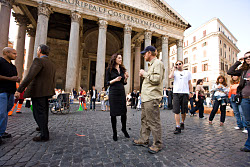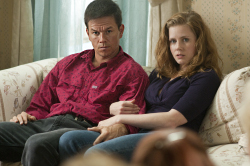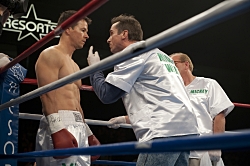The team behind the global phenomenon The Da Vinci Code returns for the highly anticipated Angels & Demons, based upon the bestselling novel by Dan Brown. Tom Hanks reprises his role as Harvard religious expert Robert Langdon, who once again finds that forces with ancient roots are willing to stop at nothing, even murder, to advance their goals.
Popular on LondonNet
When Langdon discovers evidence of the resurgence of an ancient secret brotherhood known as the Illuminati – the most powerful underground organization in history – he also faces a deadly threat to the existence of the secret organization’s most despised enemy: the Catholic Church.
Ronald William “Ron” Howard is an Academy Award-winning American director and producer as well as an actor. Since retiring from acting, he has directed many successful films including Apollo 13, A Beautiful Mind, The Da Vinci Code, and now the upcoming, Angels & Demons.
The book “Angels & Demons” by author Dan Brown was written before he created the “The Da Vinci Code” book. For the films’ production you changed that order. What are the reasons for this?
Many people wound up reading “Angels & Demons” second and I felt like for film audiences it would be very strange to go back. Tom’s character Robert Langdon could evolve and grow this way because now he gets to carry into this new adventure the experience of having lived through that other very bizarre mystery. So it definitely influences performance in ways that were very human and very entertaining. So I think it was an important thing to do.
How did your approach to adapting “Angels & Demons” differ from your approach to adapting “The Da Vinci Code”?
The Da Vinci Code was so much at the epicentre of the cultural zeitgeist that I felt a bit restricted in the terms of the adaption. Looking back I still feel very good at the choices that were made but I definitely felt liberated with “Angels & Demons” which of course is also a wildly popular novel but it doesn’t ‘t carry with it quite that degree of scrutiny and focus.
Even Dan Brown said to me, I think with “Angels & Demons” you can as a director feel freer to make it your own and do what you think you need to do to make it a modern entertaining movie. So that’s what we did. There are changes. But so far the people in our test screenings who know the book and have seen the movies are really pleased by the choices that we made. It is always a point of discussion and that’s part of the fun of going to see a movie that has been adapted from a popular book.
You had to postpone the movie and change screenwriters because of the writer’s strike. Were there any changes from the first idea for the movie to what we see now?
Because it is such a complicated story it kept evolving and at that point we had to change writers because of previous commitments. When David Koepp came in he also brought in another perspective and some really interesting, exciting creative choices came along at that point.
It didn’t change in a seismic way. It was always an adaptation of the Dan Brown novel and we always knew what the great twists and turns were that I wanted to put on the screen. It was just an ongoing evolving progress, but it was delayed and in retrospect I am so happy it was. This the 20th feature film that I’ve directed and about halfway through I remember feeling like: ‘I’m glad that I’ve had the experience of those other 19’ before making this movie because the combination of all these elements probably made it the most complicated film I’ve ever undertaken.
Rumours are that you were not allowed to film at the Vatican. Is that true? How did you overcome this problem?
How will I answer that? Formally no – we never even asked. And yet using all the technological advantages that filmmakers have at their disposal giving given digital technology I feel very confident in saying that we are able to take the audience on a very realistic authentic journey behind the walls of the Vatican. But could we bring a film crew in and shoot, no?
How has your experience of CERN, the world’s largest particle physics laboratory, changed your view of science?
It hasn’t really changed my view but it has certainly deepened my understanding into the ways in which human being are trying to explore the universe. I was reminded of NASA when I went there. But in this case the exploration is not about hurling yourself upward, it is about looking inward and understanding the world on the most microscopic level and creating these dynamic events so that we can observe. They are all laboratory experiments – every mission that NASA executes and every time they get the collider going it’s all trying to understand our universe and our place in it.
You were already very faithful to science on ‘Apollo 13’, but there was a bit of moaning and groaning about the “Angels & Demons” book from anti-matter experts as to whether they got details right. Did you make any efforts to correct the kinks in Dan Brown’s story?
Yes and no. I went there and did research and had some terrific sit downs with physicists who explained to me what was good science fiction versus utterly implausible science fiction. The film provides an environment and an understanding that some very dangerous material has been taken from this place. The movie doesn’t go to great lengths to try to explain the science or the history. In fact the rhythm of this movie doesn’t allow for that.
This is much more of a case where the audience is almost going on this ride with Robert Langdon. All we do is dole out enough information so that people can understand what is at risk, can understand the danger, can understand what is being discovering in various clue paths, what they mean, how they might relate based on conspiracy theories and history and hot button issues of the moment. So directorially I wound up using a whole other set of muscles.
We can’t see the anti-matter, how do you deal with that in the film?
You think you’ll see it. You’ll see! I will say that the production designer Alan Cameron and I spent a good deal of time at CERN and he was constantly in conference with the physicists. So yes, you don’t have to worry there’s not an amount of anti-matter slaying around that could blow up the Vatican at this moment. We did try to construct plots and things that were influenced and inspired by the information we were getting. It is fiction but it is pretty good well-informed science-fiction.








